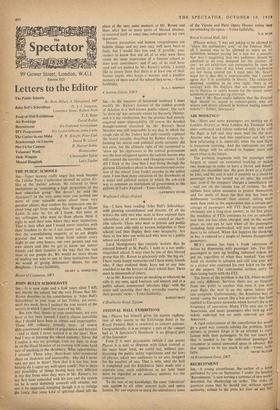AIR BOOKINGS'
SIR,—More and more passengers arc turning up at London Airport or West London Air Terminal with seats confirmed and tickets endorsed only to be told the flight is full and they must wait for the next. Anyone who has had this experience can tell you how infuriating it is, especially when the next flight is tomorrow morning. And the indications are that such things will be allowed to happen more and more often in the future.
The problem originates with the passenger who forgets to cancel an unwanted booking or makes two bookings in order to have a choice and doesn't cancel the discarded one. He goes down as a Failed to Join, and his seat is sold if possible to a stand-by passenger who has turned up on spec. An unsold seat, even if the company charges a cancellation fee —and not all do—means loss of revenue. So the airlines have taken measures to protect themselves, and for many of them the first step has been to deliberately 'overbook' their aircraft, selling more seats than exist in the expectation that a certain per- centage of passengers will FTJ. Such measures are obviously not a long-term answer; in the first place, the incidence of FTJs continues to rise as cancella- tion fees are less often charged; and, in the second place, no one can be sure when all the passengers, including those overbooked, will turn up, and some have to be refused. When this happens the checking- in bay is reduced to a jungle of furious disappointed passengers. BEA's answer has been a frank admission of defeat by dispensing with passenger lists. The first passengers to turn up holding endorsed tickets are put on, regardless of when they booked. You maY book six months in advance and still lose your seat to a slicker who endorsed his own ticket on the waY to the airport. The continental airlines carry on their losing battle with the Fri. The home of the problem is the US, where matters are very different. Services there are so frequent
from one point to another that even if you miss your flight the next is on the apron before you can complain. Unfortunately, the American way of
travel—using the system like a bus service—has been
applied to European networks which haven't the same frequency of operation. Many FTJs turn out to be Americans, and many passengers who turn up with tickets endorsed but no seats reserved are also American. A rigid enforcement of the cancellation fee would go a good way towards solving the problem. Some airlines at present forgo it in an attempt to curry favour with their passengers. In the last resort all that is needed is for the individual passenger to
remember to cancel unwanted space in advance. But that appears to be too much to ask.—Yours faith-


































 Previous page
Previous page